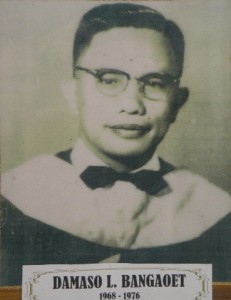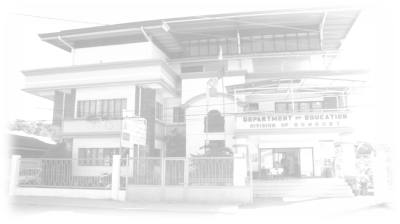History
The DepED Division of Benguet was created by virtue of Republic Act No. 5368 which was enacted on June 15, 1968. The Division of Baguio-Benguet was abolished and its stead, two separate schools divisions were created, the Division of City Schools, Baguio City and the Division of Benguet. Through the assistance of both the Provincial Government of Benguet and the Municipality of La Trinidad, a two-story building within the MSAC (BSU today) premises, was set aside to house the new Division of Benguet which actually started its operation on October 1, 1968.
 Through the years, the division had its share of the development efforts exerted by the Provincial Government of Benguet and school officials thus making it now the biggest schools division in the Cordillera Administrative Region in terms of student population, number of teachers and non-teaching personnel.
Through the years, the division had its share of the development efforts exerted by the Provincial Government of Benguet and school officials thus making it now the biggest schools division in the Cordillera Administrative Region in terms of student population, number of teachers and non-teaching personnel.
With the growth of the Division, the original office location was too small to provide basic education services, again through the help from the Provincial Government, a new and larger building was built within the Provincial premises which located at Wangal, La Trinidad, Benguet. The Division of Benguet officially transferred their operation on January 2006.
With the approved of DepED Rationalization of 2014, the Division of Benguet is now renamed as Schools Division of Benguet which was headed by Madam Marie Carolyn B. Verano, CESO VI as the 14th Schools Division Superintendent along with Sir Nestor L. Bolayo, as OIC-Assistant Schools Division Superintendent from 2016 to September 09, 2019
On September 10, 2019, Madam Benilda M. Daytaca, Ed.D., CESO VI was assigned as the new (15th) Schools Division Superintendent and Sir Nestor L. Bolayo remained as the OIC-Assistant Schools Division Superintendent.
SDO Benguet like any other Schools Division, has three offices: the Office of the Schools Division Superintendent (OSDS), Curriculum Implementation Division (CID) and School Governance and Operations Division (SGOD).
Headed by the Schools Division Superintendent, and the Assistant Schools Division Superintendent, the OSDS ensures access, promotes equity and continuously improves the quality of basic education in the schools division. Also concerned with overseeing the implementation of programs and standards, building partnerships and networking with stakeholders of education, the OSDS makes sure that financial, human and physical resources of the schools division are managed effectively and efficiently. The Legal, ICT, Administrative and Finance Services are under the OSDS.
The office in-charge of ensuring the full implementation of the articulated Basic Education Curriculum (K to 12 BEC) and the improvement in the quality of learning outcomes is the Curriculum Implementation Division (CID) headed by the Chief Education Supervisor Rizalyn A. Guznian Ed.D. The CID division is tasked to provide technical assistance to schools in the area of curriculum implementation, instructional supervision and learning resource management. Under the CID are the Education Program Supervisors (EPS) in-charge of Instructional Management, Learning Resource Management and Development System (LRMDS) headed by an Education Program Supervisor with Project Development Officer II and a Librarian II, and the Public Schools District Supervisors (PSDS) in –charge of District Instructional Supervision. The Alternative Learning System (ALS), with the leadership of its Education Program Supervisor and Education Program Specialists, caters to the out-of-school youth to expand access to the basic education in Benguet.
The School Governance Operation Division (SGOD) completes the offices in the schools division headed by the Chief Education Supervisor, Lucio B. Alawas. SGOD is tasked to ensure the implementation of standards and policies relevant to managing schools for the purpose of effectiveness and quality management system. The units under SGOD are: School Management Monitoring and Evaluation, Social Mobilization and Networking, Human Resource Development, Planning and Research, Education Facilities and the School Health. The first three sections are managed by Senior Education Program Specialists (SEPSs) and Education Program Specialists II (EPSs).
Meanwhile, SDO Benguet is composed of fourteen (14) districts under the supervision of Public Schools District Supervisors, namely: Atok, Bakun, Bokod, Buguias, Itogon I, Itogon II, Kabayan, Kapangan, Kibungan, La Trinidad, Mankayan, Sablan, Tuba and Tublay.
Based on record, this school year 2018-2019, SDO Benguet registers the following number of public schools: Elementary (369), Junior High School (60), Junior High with Senior High School (55) and Alternative Learning System (14). These schools are managed by 369 Elementary School Heads and 60 Secondary School Heads.
SDO Benguet is committed to provide basic quality education, implement a responsive and relevant curriculum and create a conducive learning environment to around 51,068 learners in the elementary level, 22,196 in the junior high school, 6,256 in the senior high school and 3,565 learners in the Alternative Learning System. These learners are under the instruction of 2,473 Elementary teachers, 47 Alternative Learning System (ALS) teachers, 959 Junior High School teachers and 282 Senior High School teachers.
1.2 Mandate
The Department of Education was established through the Education Decree of 1863 as the Superior Commission of Primary Instruction under a Chairman. Education in the Philippines has undergone several stages of development from the pre-Spanish times to the present. In meeting the needs of the society, education serves as focus of emphases/priorities of the leadership at certain periods/epochs in our national struggle as a race. The Education agency underwent many reorganization efforts in the 20th century in order to better define its purpose vis-a-vis the changing administrations and charters. The present-day Department of Education was eventually mandated through Republic Act 9155, otherwise known as the Governance of Basic Education Act of 2001 which establishes the mandate of this agency.
The Department of Education (DepEd) formulates, implements, and coordinates policies, plans, programs and projects in the areas of formal and non-formal basic education. It supervises all elementary and secondary schools, including Alternative Learning Systems, both public and private, and provides for the establishment and maintenance of a complete, adequate, and integrated system of basic education relevant to the goals of national development.
1.3 Objectives
The following are the objectives of SDO-Benguet:
. to adhere to QMS Standards;
. to address all issues and concerns of stakeholders;
. to address all complaints of stakeholders;
. to identify stakeholders’ demands;
. to align services rendered to the demands of the stakeholders;
. to provide quality service to customers, and
. to continually improve service rendered to customers.
1.4 Vision
We dream of Filipinos who passionately love their country and whose values and competencies enable them to realize their full potential and contribute meaningfully to building the nation. As a learner-centered public institution, the Department of Education continuously improves itself to better serve its stakeholders.
1.5 Mission
To protect and promote the right of every Filipino to quality, equitable, culture-based, and complete basic education where:
- Students learn in a child-friendly, gender-sensitive, safe, and motivating environment
- Teachers facilitate learning and constantly nurture every learner
- Administrators and staff, as stewards of the institution, ensure an enabling and supportive environment for effective learning to happen
- Family, community, and other stakeholders are actively engaged and share responsibility for developing life-long learners
1.6 Core Values
Maka-Diyos
Maka-tao
Makakalikasan
Makabansa




 ‘
‘